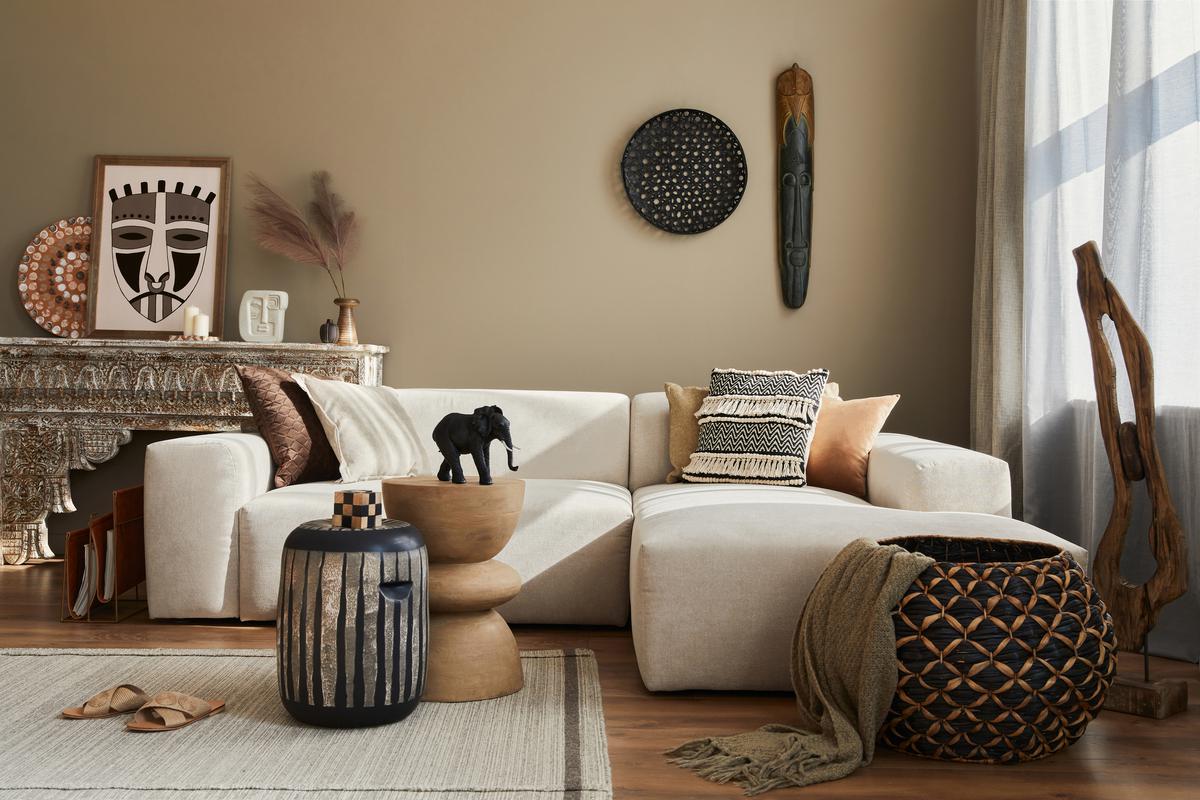While Mediterranean-style architecture is typically seen in warm-weather climates, its elements can be used to add a touch of warmth and colour to interiors anywhere
While Mediterranean-style architecture is typically seen in warm-weather climates, its elements can be used to add a touch of warmth and colour to interiors anywhere
Myriad shades of blue juxtaposed against a startling white. A stone pathway meandering through a small garden sit out. A tiled table and wrought iron chairs plonked against a sun-baked yellow stucco wall. For a long time now, the romance and drama of Mediterranean décor has enthralled me. The coming together of vibrant colours and textures leads to an earthy appeal and an inviting ambience.
The Mediterranean style has its roots in the cultures of southern European and northern African countries bordering the Mediterranean Sea. Italy, Greece, Spain and Morocco have been huge influences. And while Mediterranean-style architecture is typically seen in warm-weather climates, its elements can be used to add a touch of warmth and colour to interiors anywhere.
The easy and comfortable nature of Mediterranean décor makes it a breeze to update your home. Incorporating Mediterranean elements into your décor can create a comfortable and dramatic atmosphere. The décor can be casual or formal, rustic or elegant, grand or homey. How do you recreate the exotic air of the region in your rooms?
The elements: Mediterranean décor is defined by a few elements of style. Think bright sun-baked colours, natural light, vibrant accessories, heavy woods, black metals, and carved detailing. Elements can differ, depending on the region. “Moroccan-style design is heavy on wrought iron, patterned tiles, stucco walls and bright textiles. Spanish elements include rich woven tapestries, wrought iron and pottery. Greek-style décor evokes the colours of the sea — deep blues, bright aquas and vibrant turquoises are juxtaposed against white walls and floors. Italian essentials include earthy materials such as wood beams, terracotta and clay tiles,” says Sagar Purohit, a Jaipur-based interior designer.
The colours: The colours of the sea and the sky, earth and fire take centre stage. Make your choice from the warm end of the spectrum. The scheme should evoke the rustic nature of land, the warmth of fire, and the many shades of blue that make up the sea and the sky. Colours found in the surrounding landscape also complement the scheme — choose from the browns, oranges and deep reds of the earth, light and dark greens of the countryside, lavenders and yellows of flower fields, and blues and sea greens of the water and sky. “If you aren’t quite sure of where to begin, start with sand or taupe, burnt orange, sea green, creamy yellow or olive green. Whitewashed interiors perked up by bright pops of colour also work well,” says Rohini Sen, a designer based in Kolkata.
The furniture: The furniture can be elegantly crafted from fine hardwood or can be rustic designs in regular wood. The pieces — ranging from completely functional to extremely formal — tend to be low and heavy set, and are often characterised by accents of tile, marble or iron. If you’re looking at old-style furniture, consider armoires, chest of drawers and cabinets. “A large rustic dining table with mismatched chairs adds appeal. Simplicity is key, so don’t fill up the rooms with a lot of furniture. Add colour and interest by tapping bright colours for soft furnishings,” Sagar says.

The walls: Textured walls, an essential décor element, lend rooms an aged patina. Layers of paint and glaze are often hand-rubbed onto plaster or sand-textured walls, creating visual depth. Stucco or sand paint is the perfect way to create a washed-out effect. “Select a dull wall — may be in the foyer or the hallway — to trowel on sun-baked yellow or dirty lavender, and create a dramatic effect. Plaster mouldings, cornices and columns add an elegant appeal,” Rohini says.
The flooring: Mediterranean décor translates into hard flooring. Among the many materials that can be put to use are tiles, be they hardwood, ceramic tiles, terracotta tiles, mosaic tiles, limestone or travertine. A terracotta or brick floor is a sure-shot way of adding the Mediterranean flavour. Mosaic tile designs can be woven into the floors for an authentic feel. Mosaic tiles can be used around the house — on staircase treads and risers, around door and window frames, and in the kitchen backsplash.
The accessories: Apart from brilliant mosaic tile work on walls and furniture, colourful accents also define the Mediterranean style. Colourful pottery adds a dash of cheer, indoors or outdoors. Choose from pots and vases in a variety of forms and shapes. Vibrant wall tapestries can be used as window treatments or displayed on wrought iron rods. Don’t skip metal — wrought iron wine racks, candle stands, light fixtures, mirror frames and burnished brass urns add a sense of drama. Filigree light fixtures lend a Moroccan flavour. Colourful and ethnic rugs will brighten up dark floors. “Mediterranean homes say hello to the sun each morning by leaving windows undressed. Try using soft drapes with blinds to recreate an uncluttered look,” Rohini says.
And when the sun climbs high in the sky, bask in your Mediterranean getaway with the perfect companions — a chilled glass of juice and a new book!
























